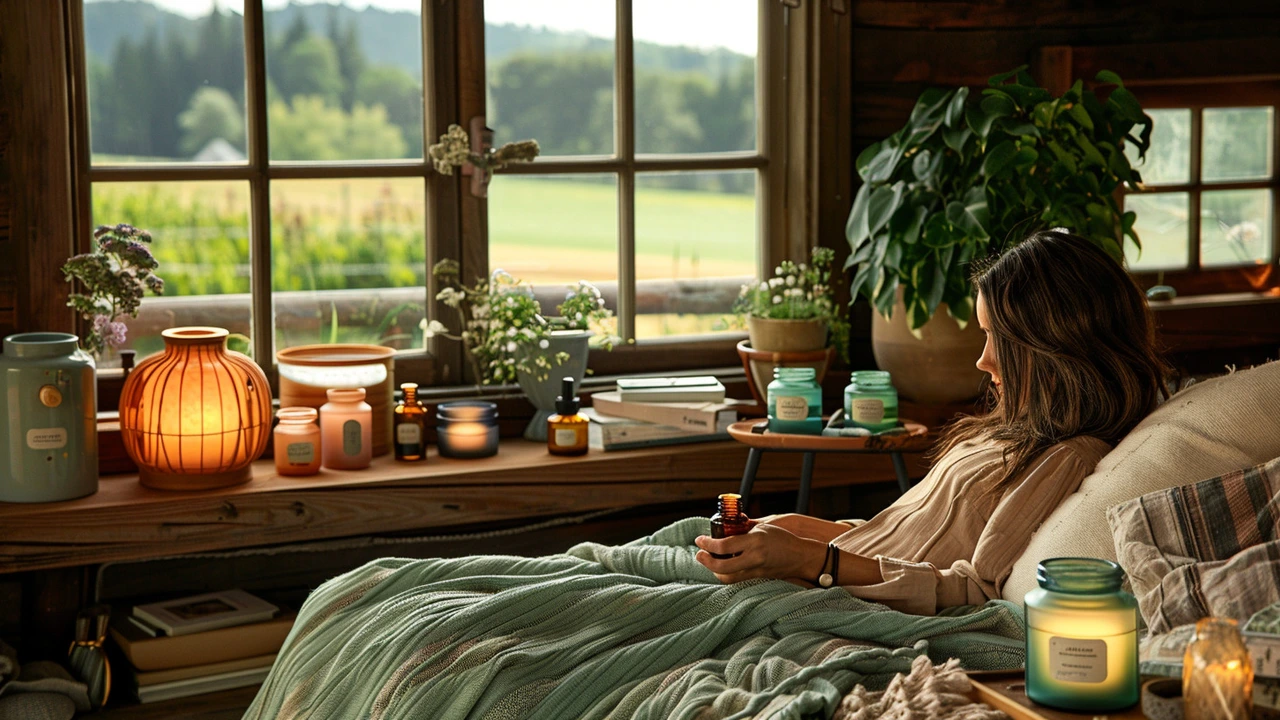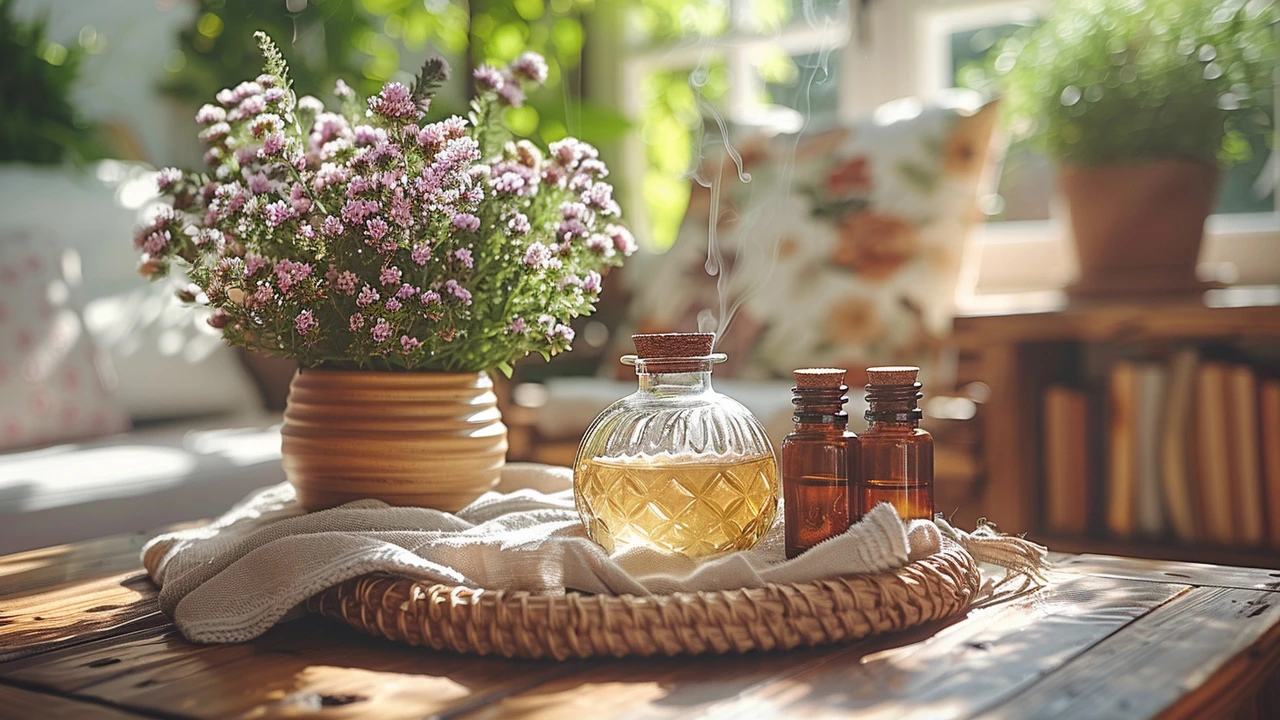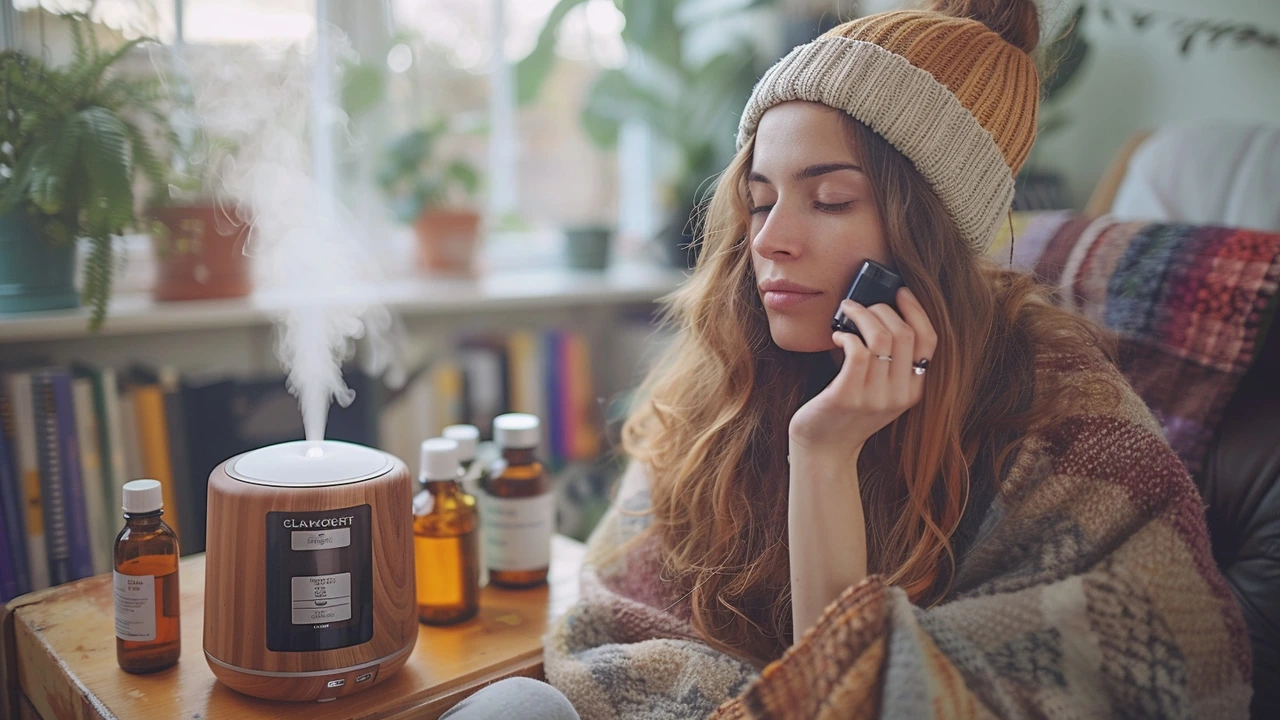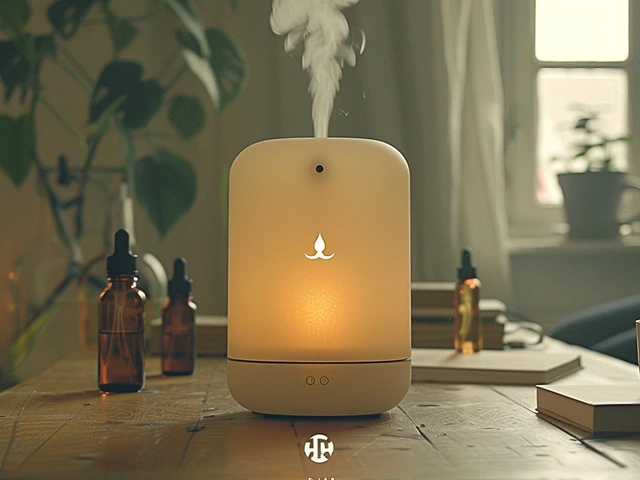Aromatherapy offers a natural, aromatic way to boost emotional health.
It’s based on the use of essential oils extracted from plants, herbs, and flowers, each with unique properties. These oils can help improve mood, reduce stress, and even alleviate symptoms of depression and anxiety.
Understanding the basics of aromatherapy, including how it works and the benefits it brings, can be a wonderful first step towards incorporating this practice into your life. Let’s explore how different essential oils can influence emotions and how to make them a part of your daily routine.
- What is Aromatherapy
- The Science Behind Aromatherapy
- Impact on Emotions and Mental Health
- Popular Essential Oils for Emotional Well-being
- Methods of Using Aromatherapy
- Tips for Incorporating Aromatherapy into Daily Life
What is Aromatherapy
Aromatherapy is a holistic healing treatment that uses natural plant extracts to promote health and well-being. It’s sometimes referred to as essential oil therapy. Aromatherapy has been around for thousands of years, with the earliest known use dating back to ancient civilizations such as Egypt, China, and India. These cultures incorporated aromatic plant components in resins, balms, and oils.
One of the primary aspects of aromatherapy is the use of essential oils, which are concentrated extracts from the leaves, flowers, bark, roots, and other parts of plants. Each oil carries a distinct aroma and set of properties. Depending on the oil's type and composition, it can have various therapeutic effects, ranging from stimulating and energizing to calming and soothing.
The term 'aromatherapy' itself was first coined by the French chemist René-Maurice Gattefossé in 1937 after he accidentally discovered the healing properties of lavender oil. According to his account, he used the oil to treat a burn on his hand, observing how effective it was in reducing pain and promoting healing. From there, the practice grew, combining elements of herbal medicine and the therapeutic use of scents.
Today, aromatherapy is used in a variety of settings, including clinics, hospitals, and homes. It’s also a popular complementary therapy in many forms of wellness practices such as massages, yoga, and meditation. According to the International Journal of Neuroscience, even just inhaling certain aromas can impact brain wave patterns and behavior. Many people find that aromatherapy helps them to feel better physically, emotionally, and mentally.
"Aromatherapy is more than just a pleasant smell; it’s a powerful tool for healing and emotional well-being," says Valerie Ann Worwood, author of 'The Complete Book of Essential Oils and Aromatherapy'.
Using essential oils is relatively simple. You can add them to a diffuser, mix them with carrier oils for massage, integrate them into bath rituals, or create personal inhalers. Each method offers a different way to integrate these aromatic compounds into your life, providing versatile options to suit individual preferences and needs.
The Science Behind Aromatherapy
The practice of aromatherapy rests on the understanding that our senses, especially our sense of smell, are deeply connected to our emotions and overall well-being. The basic principle behind aromatherapy is that the inhalation or topical application of essential oils triggers responses in the brain, particularly the limbic system, which is often referred to as the 'emotional brain.' This part of the brain is responsible for regulating emotions, memory, and even motivations.
One of the most fascinating aspects of aromatherapy is its ability to create almost instant changes in mood and behavior. When you inhale essential oils, the molecules travel through the nasal passage and reach the olfactory bulb, which is directly connected to the limbic system. This interaction can cause shifts in brain chemistry, influencing the production of neurotransmitters like serotonin and dopamine, which are crucial for mood regulation.
Research has revealed some compelling findings about the effects of aromatherapy on mental health. A study published in the Journal of Advanced Nursing found that patients with anxiety experienced significant reductions in their symptoms after using lavender essential oil. Lavender’s calming properties come from compounds like linalool and linalyl acetate, which have been shown to have sedative effects on the nervous system.
The impact of aromatherapy on stress is another well-documented benefit. A meta-analysis of studies on aromatherapy and anxiety published in Evidence-Based Complementary and Alternative Medicine noted that aromas from essential oils like chamomile and bergamot can decrease stress levels by influencing heart rate and blood pressure. It’s fascinating to see how specific scents can have measurable physiological effects.
"Aromatherapy may not cure chronic mental health conditions, but it certainly plays a supportive role in enhancing emotional well-being." – Dr. Jane Buckle, renowned researcher in clinical aromatherapy.
Another aspect to consider is the potential of aromatherapy to aid in better sleep, thereby indirectly improving emotional health. Essential oils like lavender and sweet marjoram are known to promote relaxation and drowsiness, helping those who struggle with insomnia. Better sleep, as we know, is foundational to maintaining good mental health and emotional stability.
Additionally, aromatherapy has been found beneficial in alleviating symptoms of depression. For instance, a study published in the Journal of Ethnopharmacology highlighted how rose oil's natural compounds can act as mild antidepressants by increasing serotonin levels in the brain. This connection between scent and mood offers an amazing, natural way to support mental health.
Beyond these specific examples, the holistic nature of aromatherapy means that it often works in conjunction with other forms of treatment to amplify their effects. For instance, combining essential oils with practices like meditation or yoga can deepen the relaxing experience, making these wellness routines even more effective. Understanding the science behind aromatherapy unveils a world where nature’s scents aren’t just pleasant to the nose but profoundly beneficial to the mind and body.

Impact on Emotions and Mental Health
Understanding how aromatherapy influences emotions and mental health requires diving into the profound connection between our sense of smell and the brain. The olfactory system, responsible for our sense of smell, directly connects with the limbic system, which is the part of the brain that controls emotions, memories, and arousal. This close relationship explains why certain scents can evoke powerful memories or intense feelings of relaxation or anxiety.
Essential oils, extracted from various parts of plants, have unique chemical compositions that interact with the brain in specific ways. For instance, lavender oil is famous for its calming effects. Studies have shown that inhaling lavender can reduce anxiety levels and improve sleep quality, both of which are crucial for emotional stability and mental health. The soothing aroma of lavender helps to lower cortisol levels in the body, easing stress and promoting a sense of tranquility.
"Aromatherapy offers a way to enhance emotional well-being by influencing the brain’s limbic system, which affects mood and behavior," says Dr. Jane Buckle, a leading expert in aromatherapy.
Citrus oils, such as lemon and orange, are another group of essential oils with a significant impact on emotions. These oils are known for their uplifting and energizing properties. Research has highlighted that the scent of lemon can enhance mood, reduce feelings of anger and frustration, and even increase cognitive performance. This makes citrus oils an excellent choice for combating depression and promoting a more positive outlook on life.
Then there's peppermint oil, which can provide a burst of energy and mental clarity. A study published in the Journal of the International Society of Sports Nutrition found that inhaling peppermint oil increased alertness and improved exercise performance. By stimulating the mind and body, peppermint oil can help combat fatigue, which is often a significant factor in emotional and mental well-being.
Another fabulous essential oil is ylang-ylang -- known for its ability to uplift mood and promote relaxation. Its sweet, floral scent has been shown to lower blood pressure and heart rate, creating a calming effect that can help alleviate stress and anxiety. Aromatherapists often recommend ylang-ylang for individuals dealing with chronic stress or mood disorders.
It's essential to note that everyone’s response to different scents can vary. Personal experiences and associations with particular scents play a significant role in their effectiveness. This means that while one person might find lavender calming, another might not experience the same level of relaxation from it. Experimenting with different oils and observing your body's response can help identify which scents best support your emotional and mental health.
Using essential oils for emotional well-being doesn't just stop at inhalation. Topical application and aromatherapy massages are also effective methods. For instance, massaging diluted essential oils onto the skin allows for direct absorption, resulting in more sustained effects. Maintaining an aromatherapy diffuser in a room can help disperse the oil’s scent continuously, creating a soothing environment that supports emotional balance throughout the day.
Popular Essential Oils for Emotional Well-being
When it comes to enhancing emotional well-being, several essential oils have become renowned for their uplifting and calming effects. These oils are commonly used in aromatherapy to promote mental balance, relieve stress, and elevate your mood.
One of the most popular essential oils is lavender oil. Known for its soothing properties, lavender oil can help reduce symptoms of anxiety and depression. Research published in the journal Frontiers in Behavioral Neuroscience found that lavender oil has a calming effect on the nervous system, promoting relaxation and better sleep quality. To use lavender for emotional support, try diffusing it in your living space or adding a few drops to a warm bath.
Another powerful oil is bergamot oil. This citrusy-scented oil is known for its ability to reduce stress and anxiety. A study in the Journal of Complementary Therapies in Medicine demonstrated that bergamot oil can significantly reduce cortisol levels, the body's primary stress hormone. To harness its benefits, you can diffuse bergamot oil or apply it topically on your chest with a carrier oil like coconut or jojoba oil.
Frankincense oil is also a highly treasured oil in aromatherapy. With its grounding aroma, frankincense can foster a sense of peace and help alleviate feelings of overwhelm. It has been used for centuries in various religious and spiritual ceremonies for its meditative properties. A few drops in a diffuser during meditation or yoga can create a serene atmosphere conducive to emotional well-being.
“Aromatherapy is a complementary treatment, meaning it works alongside other treatments to improve well-being and is thought to work by stimulating smell receptors in the nose, which then send messages through the nervous system to the part of the brain that controls emotions.” – Mayo Clinic
Sweet orange oil, with its fresh and uplifting scent, is another excellent option. This oil is often used to combat feelings of sadness and enhance mood. According to a study in the Journal of Alternative and Complementary Medicine, sweet orange oil can offer immediate anxiety relief. To enjoy its benefits, you can inhale it directly from the bottle, diffuse it, or add it to lotions or massage oils.
Peppermint oil is recognized for its invigorating and refreshing properties. This oil can boost energy levels and improve mental clarity, making it ideal for combating fatigue and stress. Applying peppermint oil to your temples or the back of your neck can provide a quick pick-me-up during long work hours.
Ylang-ylang oil is valued in aromatherapy for its ability to reduce anxiety and promote a sense of well-being. This floral-scented oil can help lower blood pressure and improve mood. Diffusing ylang-ylang oil or adding it to a body lotion can create a calming self-care routine.
Integrating these essential oils into your daily life can offer numerous benefits for emotional health. Whether through diffusers, baths, or topical applications, finding the right essential oil for your needs can be a vital step in achieving emotional balance and well-being.

Methods of Using Aromatherapy
Aromatherapy can be a delightful and beneficial addition to your daily routine. There are numerous ways to utilize essential oils to achieve emotional well-being. The method you choose can depend on your personal preferences and the specific benefits you are looking for. One common method is through inhalation. Simply breathing in the scent of essential oils can have a direct effect on your brain's limbic system, which controls emotions and memory. You can use a diffuser, spray, or even dab a few drops on a cloth to inhale throughout the day—each method serving its own unique purpose in delivering the delightful fragrances and calming properties.
Another popular way to experience the benefits of aromatherapy is through topical application. Essential oils are often added to massage oils, lotions, and balms. When applied to the skin, they can provide both emotional and physical benefits. For example, lavender oil is well-known for its calming properties and can be rubbed onto pulse points to reduce anxiety. However, it’s crucial to remember that essential oils are highly concentrated and should be properly diluted in a carrier oil to avoid skin irritation. A typical dilution ratio is about 3-5 drops of essential oil per teaspoon of carrier oil.
Bathing is another luxurious way to incorporate essential oils into your routine. Adding a few drops of oil like eucalyptus or chamomile to your bathwater can turn an ordinary bath into a relaxing, spa-like experience. The warm water helps to release the aromatic compounds, while the oils themselves can nourish and soothe the skin. This method is fantastic for unwinding after a long day and creating a serene environment for emotional healing.
Using A Diffuser
Diffusing essential oils is perhaps the easiest and most popular method. An essential oil diffuser disperses the oils into the air, filling your space with therapeutic aromas. There are several types of diffusers available, including ultrasonic, nebulizing, and heat-based diffusers. Ultrasonic diffusers are especially popular as they use water to disperse the oils, allowing them to run for hours and humidify the air at the same time. Choosing the right essential oil for your diffuser can significantly influence your mood, productivity, and overall emotional balance.
Aromatherapy Massage
Aromatherapy massage combines the power of touch with the therapeutic properties of essential oils. It’s a profoundly relaxing experience that can help release tension, improve circulation, and enhance emotional well-being. Choosing the right blend of oils for your massage is key. You might opt for invigorating oils like peppermint and ginger to recharge your energy or calming oils like ylang-ylang and sandalwood to create a tranquil atmosphere. Remember to communicate with your massage therapist about any allergies or preferences to ensure a personalized and safe experience.
"Essential oils are gifts from the earth; their uses and benefits are vast and enchanting, offering a sensory experience that promotes emotional balance," states Dr. Scott Johnson, a renowned expert in aromatherapy.
Creating Personal Aromatherapy Products
If you enjoy DIY projects, creating your own aromatherapy products can be both fun and rewarding. You can craft personal fragrances, mood-boosting room sprays, or even scented candles tailored to your preferences. Start with a simple recipe by mixing essential oils with alcohol and water in a spray bottle to create a refreshing room spray. Or, melt some soy wax and add your favorite essential oils to create custom-scented candles that will fill your home with soothing aromas. Experimenting with different combinations will allow you to discover what scents resonate most with your emotional needs.
The versatility of aromatherapy makes it accessible and adaptable to any lifestyle. By exploring these methods of using essential oils, you can unlock a world of emotional wellness and sensory delight. Whether you choose to inhale the fragrant mist from a diffuser, enjoy a relaxing aromatherapy massage, or create your own scented products, the practice of aromatherapy offers a natural pathway to enhancing your emotional health and well-being.
Tips for Incorporating Aromatherapy into Daily Life
The healing power of aromatherapy can be seamlessly woven into your everyday routines, creating a haven of calm and emotional balance. One practical way to include aromatherapy is through the use of a diffuser. Diffusers disperse essential oils into the air, allowing you to inhale the benefits effortlessly. Simply add a few drops of your favorite oil, such as lavender for relaxation, to the water in the diffuser. Let it run for about 15-20 minutes, and you'll start noticing a subtle yet powerful improvement in your mood.
Another effective method is integrating aromatherapy into your bath. Adding essential oils to bath water not only soothes the skin but also provides an immersive sensory experience that can alleviate stress and anxiety. To do this, mix a few drops of essential oil with a carrier oil, such as coconut or jojoba oil, and pour it into your bath. This ensures the oils are evenly dispersed and safe for your skin.
For those on the go, creating a personal aromatherapy inhaler can be a lifesaver. These small, portable devices can be filled with cotton soaked in essential oils. Whenever you need a quick pick-me-up, simply take a deep breath from your inhaler. It's perfect for use during work, travel, or any time you need a moment of calm.
Additionally, you can turn your daily skin-care routine into an aromatherapy ritual by incorporating essential oils into your lotions and moisturizers. A couple of drops of oil mixed into your favorite lotion can transform it into a mood-boosting treatment. Opt for oils like rose or chamomile, known for their calming properties, to promote emotional well-being.
The kitchen isn't off-limits to the benefits of aromatherapy either. Cooking with essential oils can add an extra layer of flavor and wellness to your meals. Oils like basil, lemon, and peppermint are safe to ingest in small amounts and can be a delightful addition to your culinary creations. Make sure to choose food-grade oils and use them sparingly, as they are highly concentrated.
Of course, the simplest way to enjoy the benefits of aromatherapy is by using essential oil blends on your pillow. A few drops of a calming blend on your pillowcase before bed can foster restful sleep, greatly influencing your emotional health. Known sleep aids like lavender, chamomile, and ylang-ylang can transform your night into a soothing experience.
Research indicates that certain essential oils may have measurable benefits. According to a study by the American College of Healthcare Sciences:
"Lavender has been shown to reduce anxiety and emotional stress, improve sleep, and even lessen pain."
Adding a touch of aromatherapy to your cleaning routine can also be incredibly beneficial. Using essential oils like tea tree or eucalyptus in DIY cleaning products can provide a fresh scent and natural antibacterial properties. Mix a few drops with vinegar and water in a spray bottle to create an effective, aromatic cleaner for surfaces around your home.
Aromatherapy doesn’t need to be complicated. By incorporating these tips into your daily life, you can harness the power of essential oils to enhance your emotional well-being. It’s a simple yet effective way to create a more balanced and harmonious life, one serene breath at a time.






